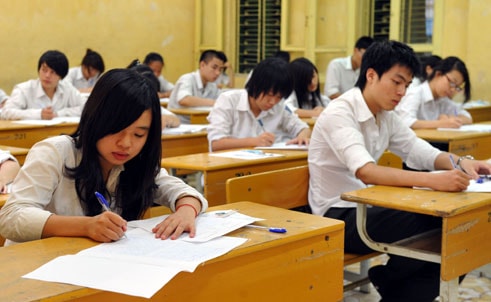High school graduation exams and university and college admissions will have many changes
Professor Nguyen Minh Thuyet - Editor-in-Chief of the New General Education Program said that when the new general education program is applied, the high school graduation exam and university and college admissions will change.
 |
| Illustration photo. |
The exam will not be based on any specific book.
According to Professor Thuyet at the press conference announcing the Draft of the new general education program on the afternoon of January 19, around April 2018, the Ministry of Education and Training will issue the new General Education Program. Regarding the form of high school graduation exams and university and college admissions, from now until 2020, it will remain stable as it is now.
By 2020, after the new general education program is implemented, the examination system will change to match the new general education program. However, Professor Thuyet said that the change is not simple. The Ministry of Education and Training has sought organizations to measure and research this issue.
“Through bidding, the Center for Educational Quality Measurement and Assessment won the bid. This unit will conduct research and report to the Ministry on preparations for innovating the form of student capacity assessment, including the high school graduation exam, and will soon report to the Minister,” said Professor Thuyet.
According to the new general education program drafting committee, exams will not be based on any specific books.
Answering the question about the new general education program having many fundamental changes. For example, in the Literature subject, instead of applying a broad curriculum as before, there will soon be only 6 compulsory works. Other authors and works will be selected by the Program Drafting Committee. So how will the exams change?
Associate Professor, Dr. Do Ngoc Thong, Editor of the Literature Program, said that an open program for teachers to be autonomous, self-selected, and creative is very necessary.
However, this will involve changes in the examinations. “It is true that the assessment of the examinations will change, but it must be based on the program standards, based on the requirements to be achieved as in the program, not based on any specific textbooks, especially when we are advocating for one program with many sets of textbooks.
Therefore, the person who makes the test must base it on the requirements of that class, of that level to make the test. For example, my Literature subject has many optional works. Many teachers may find this work good, meet the program, and then include it in the teaching. But when testing, the person who makes the test will base on the requirements to choose the texts that students have not studied in the textbook.
This completely measures the students' application ability. And the assessment is to assess practical ability, so there is nothing to worry about exams," Associate Professor Thong said.
Not started writing textbooks yet
There are only 2 years left before the new general education program is implemented. Many people are wondering whether it is possible to imagine what the design of the textbooks will be like. When will the textbooks be compiled? Professor Thuyet said that the program has not been issued yet, so the textbooks cannot be written yet.
When the new general education program is officially issued, textbook writers will be selected.
When the new general education program is officially issued, textbook writers will be selected.
According to Professor Thuyet, according to Resolution 88/2014/QH13 on textbook program innovation of the National Assembly, many organizations and individuals will be able to compile textbooks according to their ideas for effectiveness.
In particular, according to current regulations, textbooks are not laws but are the main documents for learning at the general education level. Therefore, teachers can apply them flexibly in teaching.
Regarding reducing the workload while implementing the new program, according to Professor Thuyet, there are many ways such as: reducing complicated exercises or unnecessary difficult knowledge.
“However, the reduction does not have to be done mechanically, but some subjects can be reduced by reorganization. For example, History is not taught in a concentric way but reorganized by teaching according to historical memories (at primary level), teaching according to general history (at secondary level), teaching according to topics (at high school level), or integrated teaching, ...
Or there is another way to reduce the load, which is to change the method, let students do more activities...", Professor Thuyet affirmed.

